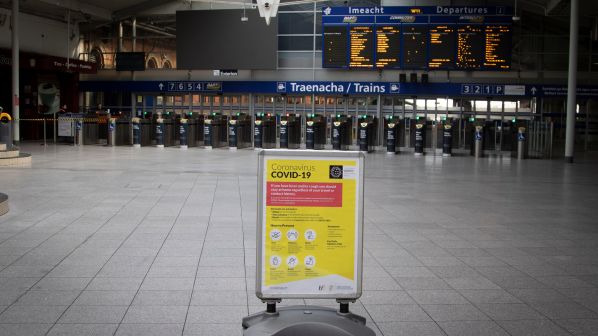THE Community of European Railway and Infrastructure Companies (CER) has reported that estimated total revenue for the European Union’s (EU) rail sector fell by around €26bn year-on-year in 2020 due to the Covid-19 pandemic, with passenger operators accounting for €24bn of this figure.
The results were gathered through the compilation of CER’s monthly member surveys and were presented to CER’s General Assembly via videoconference on January 26. Survey results for November and December are currently estimates and will be confirmed in the coming months.
CER says the survey found that although both passenger and freight services were impacted by the pandemic during the first half of 2020, the two sectors were affected differently during the second half of the year.
Passenger operators
Passenger services were significantly worse affected, reporting a 42% year-on-year decline in revenue compared with 2019, equivalent to a reduction in total sector revenue of approximately €24bn.
CER says the overwhelming negative impact of the coronavirus pandemic on passenger services last year was such that other potential causes for the calculated fall in revenue were impossible to single out.
Commercial long-distance passenger services suffered higher losses in general, with companies specialising in long-distance cross-border services hit the hardest. Regional and public sector operators typically fared better during the pandemic.
Although passenger services experienced a brief up-swing in traffic due to the loosening of pandemic restrictions during the summer, revenues began to deteriorate again from the autumn onwards, reaching record sector-wide losses of 50% for December.
Rail freight operators
By comparison, rail freight operators reported only a 12% fall in revenue compared with 2019, equivalent to approximately a €2bn loss, again primarily caused by the coronavirus pandemic.
At the beginning of the crisis in Europe, between February and March, the fall in European rail freight activity was caused by a sharp decline in industrial output in China due to Covid restrictions put in place in previous months, which impacted China-European freight levels with a delay of around 6-8 weeks linked to the duration of intercontinental shipping routes. This was compounded by a fall in internal demand in Europe itself following the start of the first wave of lockdowns.
Commodities affected during the first stage of the pandemic in Europe included the transport of oil products due to lower European demand for energy, as well as the transport of raw material and energy products due to industrial lockdowns.
Recovery
Despite the negative impact of the Covid-19 pandemic, CER says that the crisis has provided opportunities for the rail sector to demonstrate its value to the European economy. During the pandemic, rail operators continued to maintain essential passenger services, and rail freight was seen as an efficient way to move large amounts of freight, in particular essential goods such as agricultural products, food, paper and medical equipment, with minimal staff.
CER suggests that the rail sector should position itself as a potential backbone for future European economic development and recovery following the economic downturn to ensure that the sector gains recognition from policymakers.
“The Covid-19 crisis is impacting heavily on railways,” says CER executive director, Mr Alberto Mazzola. “However, the rail sector is showing resilience and capacity to help fight the pandemic and assist society on the road to recovery. Getting Europe’s economy back on track while continuing to bring down global emissions is a pressing dual challenge. The European Year of Rail is a timely recognition of the role railways can and should play on these fronts.”

